Understanding Exotic Veterinary Care: A Comprehensive Guide


Intro
Exotic veterinary care represents a distinct and complex sector within animal healthcare. Many pet owners now opt for non-traditional pets such as reptiles, birds, and small mammals. While these animals can be rewarding to care for, they come with unique health concerns, dietary needs, and requirements for specialized veterinary services. Understanding these aspects is crucial in fostering a supportive and healthy environment for these pets.
Veterinarians specializing in exotic animals face significant challenges. They often deal with species that have vastly different physiology and behavior compared to common domestic pets like cats and dogs. This necessitates a strong foundation in both veterinary medicine and animal husbandry to provide effective care. The following sections aim to shed light on various factors that pet owners should consider when navigating the world of exotic veterinary care.
Preface to Exotic Veterinary Care
Exotic veterinary care is a crucial aspect of the broader field of veterinary medicine. This section aims to highlight the importance of understanding this specialized area and the unique characteristics associated with it. As people become more connected with nature, many pet owners select exotic animals as companions. This shift brings specific responsibilities and challenges that require informed decision-making and specialized care strategies. The health and well-being of these pets depend heavily on appropriate professional attention.
Veterinarians dedicated to exotic animals face various obstacles that differ from those encountered in traditional veterinary practice. This is due to the complexity of conditions affecting these species, which often necessitate specialized knowledge in biological and nutritional sciences. Therefore, the training and qualifications of these veterinarians are paramount. Additionally, exotic pets often have distinct habitat and dietary needs that don't align with more familiar pets, thus emphasizing the need for educated care.
Understanding the intricacies of exotic veterinary care not only benefits the animals but also empowers pet owners. Owners can make informed choices regarding their pets' welfare, thus creating healthier environments and interactions.
Defining Exotic Pets
Exotic pets can encompass a wide variety of animals that are not commonly recognized as traditional household pets. This includes, but is not limited to, species such as reptiles, exotic birds, small mammals like hedgehogs, and even some aquatic creatures. It is crucial to define what constitutes an exotic pet versus standard pets like cats and dogs because it frames the entire conversation around their proper care and treatment.
While definitions may vary, exotic pets are typically classified based on their rarity, unique care requirements, and biological differences. For example, reptiles like iguanas and snakes have specific habitat needs and diets involving live or specialized foods. In contrast, traditional pets might thrive on simpler, commercially available kibble or canned food.
Recognizing these distinctions is essential in fostering a better understanding of the care required to maintain the health of these animals. Incorrect assumptions about exotic pets can lead to various health issues and ultimately affect their quality of life.
Evolution of Exotic Veterinary Medicine
Exotic veterinary medicine is a relatively young field compared to traditional veterinary practices. Its progress has been significantly shaped by societal changes, pet ownership trends, and scientific advancements over recent decades. Initially, the veterinary field primarily catered to dogs and cats. However, as public fascination and ownership of exotic animals grew, a gap became apparent in the provision of suitable medical care for these species.
This prompted veterinarians to develop specialized training and certifications focused on exotic animal care. The evolution of exotic veterinary medicine reflects advancements in knowledge about the physiological and behavioral needs of these animals. Additionally, the integration of research and technology has also played a significant role in this evolution. For instance, veterinary diagnostic imaging technologies have improved, enhancing the ability to diagnose health issues in non-traditional pets.
The field continues to adapt, reflecting ongoing research and a deeper understanding of the unique needs of various species. As exotic pets become more common in households, the demand for skilled veterinarians continues to rise. An understanding of the evolution of this specialized field enriches awareness among pet owners, encouraging responsible ownership and care.
Qualifications for Exotic Veterinarians
The realm of exotic veterinary care requires specific qualifications that extend beyond general veterinary practices. The unique needs of exotic pets—ranging from reptiles to birds and small mammals—demand veterinarians who have specialized knowledge and skills. Understanding these qualifications is crucial for pet owners seeking the right care for their non-traditional pets.
Education and Training Requirements
Veterinarians who care for exotic animals must typically complete a Doctor of Veterinary Medicine (DVM) program. However, their training does not end there. Postgraduate education or internships focused on exotic species are highly recommended. This additional training equips veterinarians with the knowledge needed to understand the specific anatomical and physiological differences in exotic species compared to familiar pets like dogs and cats.
Several veterinary schools now offer specialized courses or electives in exotic animal care. These can cover various topics, such as species-specific diseases, husbandry practices, and diagnostic techniques tailored for non-traditional pets. Aspiring exotic veterinarians may also benefit from attending workshops and conferences to stay updated on the latest advancements in the field.
Students must embark on hands-on training to cultivate practical experience. This will often involve working directly with exotic animals in clinical settings under the supervision of experienced veterinarians. In turn, this real-world exposure enhances their capability to manage health concerns unique to exotic pets.
Certification in Exotic Animal Medicine
Certification plays a key role in establishing a veterinarian's credibility and expertise in exotic animal medicine. Many veterinarians choose to obtain board certification from organizations such as the Association of Exotic Mammal Veterinarians or the American Board of Veterinary Practitioners. This certification process demands rigorous study and assessments to demonstrate a high level of proficiency in exotic animal care.
Certification validates the veterinarian's commitment to maintain a thorough understanding of their specific field. It enhances trust among clients, as pet owners tend to prefer vets who have specialized credentials in handling unique creatures.
Moreover, continuing education is a requirement for maintaining certification. This reinforces the importance of ongoing learning and adaptation in a rapidly advancing field. Various platforms, including the American Veterinary Medical Association, provide resources and courses to help veterinarians fulfill these educational needs.
In summary, the qualifications for exotic veterinarians encompass comprehensive education, practical training, and certification in specialized areas. These components are essential for offering effective and informed care to exotic pets, and they serve the interests of both the animals and their owners.
Common Exotic Species Treated by Veterinarians
Understanding the common exotic species treated by veterinarians is crucial for both pet owners and veterinary professionals. Each type of exotic pet comes with its own specific needs, health issues, and care requirements. By recognizing these species and their particular challenges, owners can ensure better health and well-being for their pets while fostering a collaborative relationship with their veterinarians.
Reptiles
Reptiles such as snakes, lizards, turtles, and tortoises are increasingly popular as pets. These creatures require specialized habitats that mimic their natural environment. Temperature management, humidity levels, and light exposure are essential for their health. Many reptile species can be susceptible to metabolic bone disease, which arises from inadequate calcium and UV light exposure. It is therefore important for owners to provide a balanced diet and proper lighting.
Veterinarians must be knowledgeable about the specific needs of different reptile species. Regular check-ups can help in early detection of potential health problems, which often go unnoticed until the issue becomes severe. Veterinarians specializing in reptiles will understand these nuances and can provide targeted advice for care.
Birds
Birds, including parrots, canaries, and finches, are another segment of exotic pets that require attentive care. They have particular dietary and social needs, as many species thrive on a varied diet that includes fresh fruits, vegetables, and specially formulated pellets. Mental stimulation is also vital for birds, as boredom can lead to behavioral issues such as feather plucking.
Veterinary care for birds often includes regular health assessments, which can uncover conditions like seed obesity, respiratory infections, or organ dysfunction. Avians can conceal illness effectively, so knowing how to spot subtle changes in behavior or appearance is key for owners.
Small Mammals and Rodents
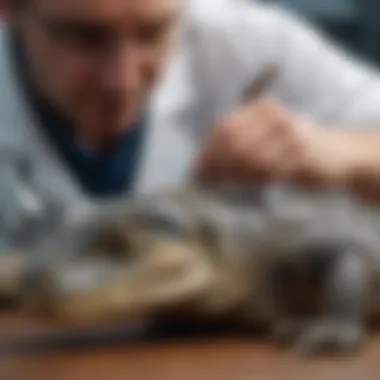

Small mammals like guinea pigs, hamsters, and rabbits are often chosen as first exotic pets due to their manageable size and generally friendly disposition. These animals are social creatures that need interaction, both with humans and other pets. Their health can be compromised if they live in isolation.
Common health issues include dental problems, obesity, and conditions related to diet. These small mammals need a diet high in fiber, and providing fresh hay should be a priority. Regular veterinary visits are crucial to monitor their overall health and dental condition.
In summary, understanding the unique characteristics of reptiles, birds, and small mammals is vital for any exotic pet owner. These animals require specialized care and attention, making it essential for veterinarians to stay informed about each species' specific needs.
Common Health Issues in Exotic Pets
Understanding common health issues in exotic pets is essential for pet owners and practitioners alike. Unlike traditional pets such as cats and dogs, exotic animals often have very unique needs and vulnerabilities that can lead to different health problems. Being informed about these issues can greatly enhance the quality of care given to these animals. It can also help in early detection, potentially saving lives and reducing long-term costs.
Nutritional Deficiencies
Many exotic pets, including reptiles, birds, and small mammals, require specific diets that differ significantly from more common domesticated pets. Often, owners may not be aware of the distinct nutritional needs of their pets. For instance, reptiles may need a careful balance of calcium and phosphorus, while some birds require particular vitamins.
Not meeting these dietary requirements can lead to significant health issues. Nutritional deficiencies can result in bone and organ malformations, weakened immune systems, and even death in extreme cases. Regular consultations with an exotic veterinarian about dietary needs and adjustments can prevent deficiencies and ensure that pets thrive.
Parasites
Parasites are a frequent concern in exotic pets. Internal and external parasites can affect any species, from birds to reptiles to small mammals. Infestations can cause a myriad of health issues, including weight loss, anemia, and digestive problems. Common parasites include mites, ticks, and intestinal worms.
Effective management requires vigilance from owners, keen observation, and regular veterinary assessments. It's crucial that pet owners are educated about the signs of parasite infestations, as early identification can lead to more effective treatment and recovery. Preventive treatments, such as routine deworming and keeping living environments clean, are strongly advised.
Respiratory Diseases
Respiratory diseases affect many exotic animals, primarily due to their sensitive physiological systems. Birds are particularly susceptible, but it can also impact small mammals like guinea pigs and rabbits. Poor air quality, temperature fluctuations, and exposure to toxins can exacerbate these conditions.
Many respiratory diseases can lead to serious health complications, often making prompt veterinary care essential. Key signs include labored breathing, nasal discharge, or changes in appetite. Understanding the environmental needs of these animals can aid significantly in avoiding these issues. Owners should be educated on maintaining optimal humidity and temperature levels and ensuring clean living conditions to minimize risks.
"Proper habitat maintenance reduces the incidence of respiratory diseases in exotic pets, showcasing the importance of environmental factors in animal health."
By understanding these common health concerns, owners and veterinarians can work collaboratively to ensure better health outcomes for exotic pets. A proactive approach not only enhances the lifespan of these animals but also fosters a fulfilling relationship between pets and their owners.
Understanding Husbandry and Its Importance
Husbandry in exotic veterinary care encompasses more than just basic care; it refers to the entire management of the animal's environment, including its habitat, diet, and psychological needs. Understanding this concept is crucial for pet owners who wish to provide a healthy and fulfilling life for their exotic animals. Proper husbandry ensures that the specific needs of different species are met, supporting their physical and mental well-being.
Habitat Requirements
Every exotic species has unique habitat needs that reflect their natural environment. For reptiles, factors such as temperature gradients, humidity levels, and the right substrate are vital. Birds often require spacious aviaries with perches while also needing an environment rich with social interaction and mental stimulation. Small mammals, like guinea pigs or rabbits, also thrive in environments that mimic their natural habitat.
Here are some important elements to consider for habitat requirements:
- Temperature and Humidity: Maintaining appropriate temperature ranges and humidity levels is crucial for many exotic species. For example, iguanas require a basking area that is significantly warmer than their cooler zones.
- Spatial Needs: Crested geckos, for example, thrive in vertical space due to their climbing nature, while some birds need ample horizontal space for flight.
- Enrichment: Having items like hiding spots, climbing structures, or toys can greatly enhance the quality of life for these pets.
By providing an optimal habitat, pet owners can prevent many health issues associated with stress and inappropriate living conditions.
Behavioral Needs
Understanding the behavioral needs of exotic pets is as important as habitat requirements. Behavior greatly influences their overall health and happiness. Many exotic animals display complex behaviors that require attention to ensure they are fulfilled and not stressed.
Consider the following factors regarding the behavioral needs of exotic pets:
- Social Interaction: Some species, such as parrots, are social creatures and require interaction with their owners or even companions of their kind to thrive.
- Mental Stimulation: Regular opportunities for exploration and playkeeping the animal engaged are essential. For example, providing safe escape routes in an enclosed area can enrich the experience for a rabbit.
- Routine and Structure: Exotic pets, much like any other animals, benefit from a predictable routine. This can reduce anxiety and encourage healthy behaviors.
"The well-being of exotic animals hinges on proper husbandry, a term that captures not just their physical needs but also their emotional ones."
Pet owners must focus on understanding these aspects of exotic animals. Ensuring a suitable habitat and meeting behavioral needs helps in preventing problems such as anxiety and boredom, which often lead to serious health issues.
By considering the aspects of husbandry—both habitat and behavioral needs—pet owners can dramatically improve the quality of life for their exotic pets. A well-managed pet not only seeks a happy and healthy existence but also fosters a deeper bond between the animal and its owner.
Ethical Considerations in Exotic Animal Care
Ethical considerations play a pivotal role in exotic veterinary care. These elements guide both veterinarians and pet owners in making informed, compassionate choices regarding the health and well-being of exotic pets. As the popularity of keeping unconventional animals rises, the ethical landscape becomes increasingly complex. It is critical to understand these issues for the proper treatment and management of non-traditional pets.
Wild vs. Domestic Practices
The difference between handling wild animals and domesticated pets shapes many ethical discussions in exotic veterinary care. Wild species often possess behaviors and health needs that are vastly different from those of domesticated animals. For instance, a parrot's social needs outstrip that of a cat or dog. Exotic veterinarians must consider these differences when developing treatment plans.
Some practitioners advocate for using practices akin to those employed in wildlife rehabilitation centers for exotic pets. This approach emphasizes natural behaviors and environments. For example, a veterinarian treating ferrets might opt for a more hands-off approach, similar to that used for other small mammals in the wild. Conversely, improper treatment rooted in domestic practices can harm exotic species. It is vital for pet owners to choose vets who understand these distinctions and apply guidelines specific to both categories of animals.
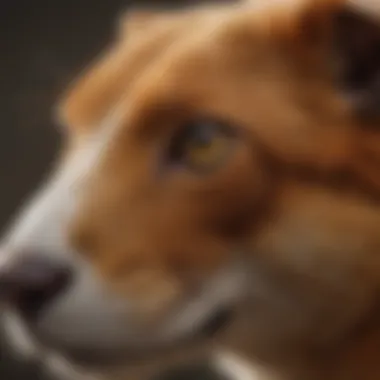
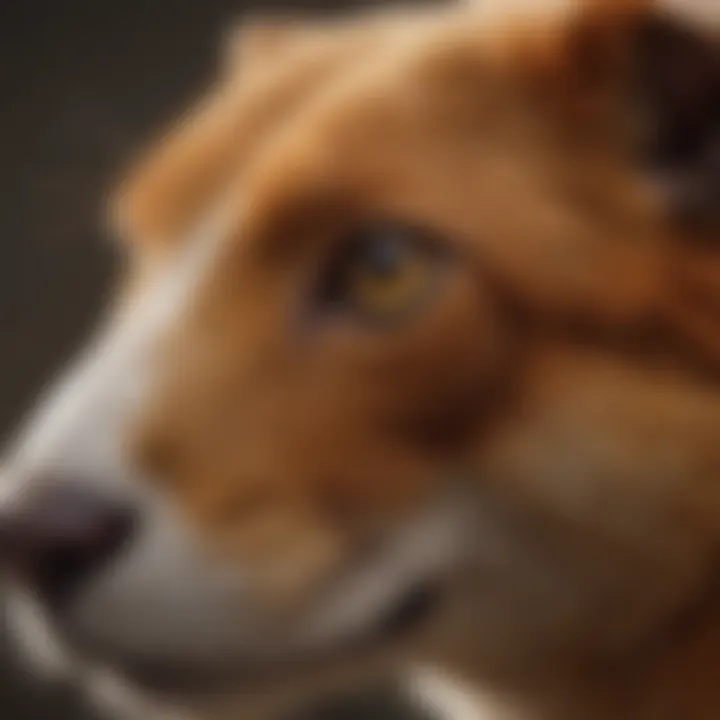
Biodiversity and Conservation
Preserving biodiversity is an essential facet of ethical care. As exotic pets become fashionable, certain species are at risk of over-exploitation. An ethical veterinarian should actively promote the well-being of these species through responsible practices and awareness campaigns.
Conservation extends beyond the treatment room; it includes education about species protection in their natural habitats. By informing pet owners about the status of certain exotic species and promoting adoption from reputable breeders or rescues, veterinarians can contribute to conservation efforts.
Moreover, veterinarians can impact local ecosystems through their practices. Encouraging owners to avoid invasive species ensures that the delicate balance of local wildlife is maintained.
"Each decision in exotic veterinary care carries implications not just for individual animals, but also for broader ecological systems."
In summary, navigating ethical considerations in exotic veterinary care requires a nuanced understanding of the needs of both exotic pets and their wild counterparts. It includes a commitment to proper husbandry, education, and responsible practices that contribute to the preservation of biodiversity. This approach not only ensures better health outcomes for these animals but also fosters a more profound respect for the interconnectedness of all life.
Client Education and Communication
Client education and communication are essential components of effective exotic veterinary care. The welfare of exotic pets hinges not only on quality medical treatment but also on informed and engaged owners. Understanding the nuances of diverse species enhances the owner’s capability to provide adequate care and recognizes when to seek professional help.
Importance of Owner Awareness
Awareness among pet owners serves as the cornerstone of effective exotic animal care. Many owners may not be fully familiar with the unique needs of their exotic pets. Each species has specific requirements regarding diet, habitat, and social interactions. If owners lack proper knowledge, they may unintentionally neglect their pet's needs.
Educating owners ensures they understand the signs of illness, which can differ significantly from those of traditional pets. For instance, reptiles might exhibit subtle changes in behavior before showing serious symptoms, while birds may hide their illness well.
Furthermore, owner awareness fosters proactive behavior in addressing health issues. By being informed about the nutritional requirements and lifestyle preferences of their pets, owners can make insightful decisions that promote health.
Developing Trust within Vet-Owner Relations
Building trust in vet-owner relationships is crucial for optimal exotic veterinary care. A strong connection between the veterinarian and the owner leads to better communication and more effective care. When pet owners trust their veterinarian, they are more likely to follow recommended treatment protocols and preventive care strategies.
Trust can be cultivated through consistent and transparent communication. Veterinarians should strive to explain diagnoses and treatment plans clearly, ensuring that the owner feels comfortable asking questions. This process removes uncertainties and builds a solid foundation for collaborative pet management.
Regular engagement with pet owners fosters a supportive environment. For example, veterinarians can offer guidance on best practices for husbandry, potential health issues, and behavioral concerns. When owners engage positively with their veterinarian, they are more likely to advocate for their pet's health, ensuring timely interventions and supportive care.
Effective communication is not just about relaying information; it’s about mutual understanding and shared goals for the pet's well-being.
Finding the Right Exotic Veterinarian
Selecting an appropriate veterinarian for your exotic pet is critical. Unlike traditional pets, exotic animals have particular needs. These needs demand a veterinarian who is not only knowledgeable but also skilled in handling a range of species. The importance of this selection process cannot be overstated. A well-qualified exotic veterinarian can provide insights into the specific dietary, environmental, and health requirements of your pet. They understand the nuances of each species, which helps in preventive care, diagnosis, and treatment.
Evaluating Expertise
Expertise in exotic veterinary care goes beyond routine animal handling. When evaluating potential veterinarians, consider the following aspects:
- Education and Training: Confirm that the veterinarian has a degree in veterinary medicine from an accredited institution. Additionally, they should have specialized training in exotic animal medicine.
- Experience: It is essential to choose a vet who has substantial experience with the specific type of exotic animal you own. This experience should include a history of caring for similar species, as health issues can vary significantly among them.
- Continued Education: Veterinary medicine is constantly evolving. A good veterinarian will engage in lifelong learning, keeping abreast of new developments in exotic animal care.
- Referrals and Reviews: Look for testimonials from other pet owners. Online reviews and personal recommendations can provide valuable insights into a veterinarian’s capabilities.
Assessing these factors will help ensure you find someone truly adept in exotic veterinary care.
Utilizing Veterinary Networks
Leverage veterinary networks to identify the right exotic veterinarian. These networks can be local or national, offering valuable resources:
- Professional Associations: Organizations such as the Association of Exotic Animal Veterinarians (AEAV) can help locate qualified vets in your area.
- Online Forums: Platforms like Reddit and Facebook have communities where pet owners share recommendations and experiences, making it easier to find trusted veterinarians.
- Networking: Engage with other exotic pet owners. They often have firsthand experiences and can point you to skilled veterinarians.
Utilizing these networks allows you to make a well-informed selection about your veterinarian. The goal is to ensure your exotic pet receives the best care possible, emphasizing both health and well-being.
Preventive Care for Exotic Pets
Preventive care is a cornerstone of successful exotic pet ownership. Many owners may not initially realize the importance of regular veterinary visits and the proactive measures necessary to maintain their pet's health. Exotic pets have unique physiological traits and are often more susceptible to specific health issues compared to traditional pets like cats and dogs. Therefore, understanding the fundamentals of preventive care is essential for any exotic pet owner.
Preventive care encompasses a range of activities designed to avert health problems before they develop into serious issues. This could include routine check-ups, proper nutrition, and vaccinations tailored to the specific needs of exotic species. Through these measures, pet owners can ensure that common illnesses are detected early, enhancing the chance for effective treatment.
Moreover, preventive care fosters a stronger bond between the pet and its owner. Regular interactions during check-ups allow owners to become more attuned to their pet's behavior and needs. This awareness can lead to quicker identification of changes that could indicate health problems.
Routine Check-Ups
Routine check-ups are vital for exotic pets. The frequency of these visits can vary based on the animal's age, health status, and species. Reptiles, birds, and small mammals each have different health considerations that need to be monitored regularly.
During these check-ups, vets will perform a comprehensive health assessment which may include:
- Physical examinations to check for any abnormalities.
- Weight monitoring to detect any sudden changes that could indicate health problems.
- Dental evaluations, especially for species prone to dental issues.
- Fecal examinations to screen for parasites.
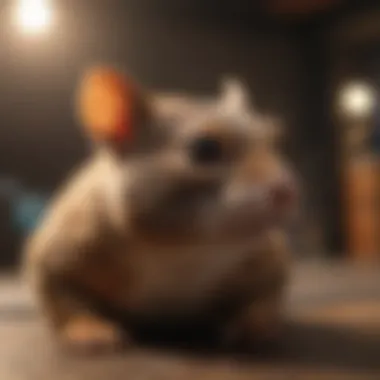
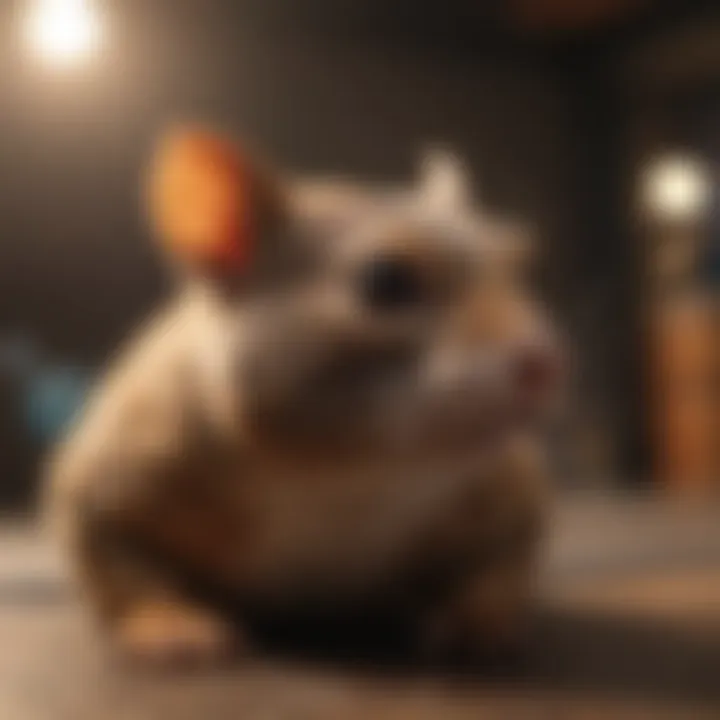
These routine visits help set a foundation for a pet's health, ensuring they remain disease-free as much as possible.
Vaccination Protocols
Vaccination is another critical aspect of preventive care for exotic pets. Many people do not realize that just like dogs and cats, exotic pets can also benefit from vaccinations. Vaccination protocols will vary between different species but generally protect against diseases that are common within specific populations.
Some key points regarding vaccination protocols include:
- Species-specific vaccines: Veterinary professionals evaluate which vaccinations are necessary based on the species and its unique vulnerabilities.
- Schedule adherence: Keeping a vaccination schedule is essential. This helps to maintain immunity over time and reduces the risk of outbreaks.
- Regular discussions with vets: Engaging in conversations with a veterinary professional about the proper timing and need for vaccines helps to ensure comprehensive coverage.
Understanding and committing to preventive care measures can significantly enhance the quality of life for exotic pets.
In summary, preventive care is fundamental for exotic pet owners. Routine check-ups and vaccination protocols form the backbone of health management strategies, ensuring a long and healthy life for these unique animals.
Advancements in Exotic Veterinary Medicine
Exotic veterinary care continues to evolve due to the increasing number of pet owners choosing non-traditional pets. Advances in veterinary medicine specifically designed for these animals enhance treatment effectiveness and expand the types of conditions that can be treated. These advancements not only improve the quality of care but also emphasize the distinct requirements of exotic species, which set them apart from conventional pets.
Emerging Research and Practices
Research in exotic animal medicine is becoming more prevalent as veterinarians seek to understand the unique biological systems of different species. Healthcare providers rely on studies focusing on various aspects, such as nutrition, disease prevention, and pharmacology tailored for exotic pets.
Recent studies have begun to address specific health issues, including species-specific diseases that affect exotic pets differently than traditional animals.
Some vital areas of research include:
- Nutritional Science: Investigating the dietary needs of various exotic species has resulted in a better understanding of nutritional deficiencies. Knowledge in this area has led to the development of specialized diets to tackle common health concerns.
- Behavioral Studies: Understanding the social and psychological needs of exotic animals can improve overall care. Emphasizing natural behaviors during treatment fosters a better recovery environment as it focuses on both physical and mental health.
- Longitudinal Studies on Lifespan: Observations on how different species react to various medical interventions inform treatment protocols, enhancing the overall care provided.
Technological Innovations
Technological advancements revolutionize the way veterinarians approach exotic animal health. From improved diagnostic tools to sophisticated imaging methods, innovation plays a key role in enhancing treatment options. These improvements streamline the process of examining and diagnosing conditions that exotic pets may face. Some notable innovations include:
- Advanced Imaging Techniques: Technologies such as MRI and CT scans tailored for smaller animals allow practitioners to obtain a clear view of conditions previously difficult to assess, facilitating accurate diagnoses.
- Telemedicine: The rise of telemedicine allows pet owners to consult with exotic veterinary specialists without long distances. This development is especially beneficial in areas where there are few specialists.
- Wearable Health Monitors: Devices that track vital signs and activity levels can provide invaluable data on a pet's health status, helping veterinarians adjust treatments and monitor recovery progress in real-time.
"Advancements in veterinary medicine enhance the quality and scope of care for exotic pets, bringing us closer to tailored solutions for diverse species."
Innovative practices and research both contribute to a more profound understanding of exotic animal needs, which ultimately benefit their health and wellbeing. As these advancements continue, the field of exotic veterinary care will become increasingly critical in the comprehensive management of these unique and often misunderstood pets.
Challenges in Exotic Veterinary Practice
Exotic veterinary care presents unique challenges that distinguish it from traditional pet medicine. This section emphasizes the need for specialized knowledge, the complexities involved in treating non-conventional pets, and the broader implications for the field of veterinary medicine. As exotic pets gain popularity, understanding these challenges is crucial. It ensures pet owners make informed decisions and advocates for better practices in veterinary care.
Access to Specialized Care
Accessing specialized care for exotic pets is a significant concern for many pet owners. Exotic animals often require specific treatments that general veterinarians may not be equipped to handle. This lack of access to specialized practices can lead to inadequate treatment and even compromise the health of the pet.
Exotic veterinarians undergo extensive education and training, focusing on species that many generalists may barely encounter. The need for specific care means owners often have to travel long distances to find a qualified vet. This situation can delay necessary treatment, leading to deteriorating health conditions in the animals.
In some regions, the number of specialists is low, resulting in high demand for their services. This situation creates a gap in availability and can discourage timely care. Often, owners of exotic pets must invest time to research and identify nearby facilities with the right expertise, which is not always easy to find.
Client Reluctance to Seek Help
Client reluctance to seek help is another barrier in exotic veterinary care. Fear of high costs, lack of knowledge about exotic pets, or past experiences with unsatisfactory service can cause owners to hesitate. It is easy for owners to underestimate the seriousness of a pet's condition, which can lead to critical situations.
A lack of understanding regarding the specific needs of exotic animals further complicates this issue. Some owners may think that a common ailment in a traditional pet applies similarly to their exotic companion, which is often not the case. This misunderstanding might lead to attempting home remedies rather than seeking professional guidance.
Pet owners must cultivate trust with their veterinarians. Open communication is vital to demystifying treatments and services available. Educating clients about the unique requirements and conditions of exotic animals can also help mitigate their reluctance.
"Pet owners ought to always seek specialized veterinary help when faced with issues related to their exotic companions. Early intervention can save lives."
Ending
The conclusion serves as a vital component of this article, encapsulating the diverse elements discussed regarding exotic veterinary care. It emphasizes the unique challenges associated with non-traditional pets and how these challenges require specialized knowledge and skills from veterinarians. The well-being of exotic pets depends heavily on the expertise available to owners and their pets, highlighting the necessity for proper veterinary care tailored to these species.
Recapping Major Insights
Throughout our exploration, several key insights emerge:
- Specialization in Veterinary Care: The field of exotic veterinary medicine is highly specialized. Understanding the distinct needs of various species is essential for effective treatment and care.
- Importance of Owner Education: Educating pet owners is paramount. Armed with knowledge about their pets' specific needs, owners can create better environments and practices that enhance their pets' health.
- Ethical Responsibility: The ethical dimensions of owning exotic pets cannot be overlooked. Owners must consider biodiversity and conservation implications while ensuring their pets thrive.
- Future Directions: Advancements in research and technology in the field continue to evolve, providing promising pathways for improving care and diagnostics for exotic animals.
By reflecting on these insights, readers can gain a clearer perspective on what to expect from exotic veterinary care and how they can contribute positively to their pets' lives.
Future Directions in Exotic Veterinary Care
Looking forward, the future of exotic veterinary care appears promising, driven by ongoing research and emerging technologies. Key trends and directions include:
- Innovative Research: As researchers delve deeper into specific needs of exotic species, more effective treatments and care protocols will emerge. This will benefit both veterinarians and pet owners.
- Technological Integration: Tools such as telemedicine and advanced diagnostic equipment will enhance accessibility to care. Remote consultations can be especially beneficial for exotic pet owners living in remote areas.
- Increased Collaboration: Building networks among veterinarians with different specialties can foster a more integrated approach to pet care. This collaboration can lead to shared knowledge and broader access to expertise.
- Focus on Preventive Care: A shift toward preventive healthcare practices will emerge as essential. Ensuring regular check-ups and vaccinations can significantly improve the health outcomes of exotic pets.







